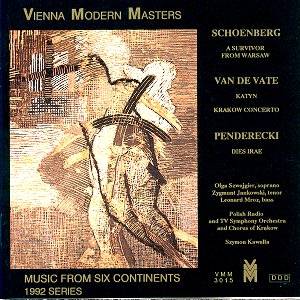The works on this disc, performed during a concert
in Krakow, dedicated to the victims of war and its survivors, were recorded
a few days later with the same performers. All works are related, in
one way or another, to the terrible events that occurred in Poland during
World War II.
Schoenberg’s A Survivor from Warsaw Op.46
is probably one of his best known pieces, and the one that has caught
the audience’s attention in the most direct way because, though serially
organised, the music is set as a melodrama capped by a rousing choral
Finale. The whole piece is fairly straightforward (by Schoenberg’s standards)
and communicates in most direct terms. I once attended a concert performance
of it years ago and the audience’s reaction was immediate. It may not
be Schoenberg’s greatest masterpiece but, to put it bluntly, it works!
Nancy Van de Vate’s Katyn for mixed chorus
and orchestra is an elegy in memory of the Polish victims of the Katyn
massacre, in which Russian troops slaughtered Polish intellectuals and
dignitaries. (Panufnik’s deeply-felt Katyn Epitaph was
also inspired by the same terrible events.) The work’s material includes
a Polish folk tune (clarinet and viola in the very first bars), echoes
from the Dies Irae and of a motet Tu pauperum refugium
by Josquin des Près. The "traditional" material is
constantly disrupted or attacked by dissonant or angry orchestral outbursts.
A quite gripping work.
Van de Vate’s Krakow Concerto for percussion
(six players) and orchestra is not directly related to war events but
rather to the history of Krakow. Thus the off-stage bugle call that
opens the piece recalls the Krakow bugler playing from the towers of
St. Mary’s Church. Of the five movements, the even-numbered are for
percussion only and serve as short dynamic Scherzos whereas the odd-numbered
movements are longer and weightier as well. The first movement is the
concerto’s actual introduction presenting the basic material on which
most of the ensuing music is founded. The third movement is a sort of
variations on the expressive melody with which it opens. The final movement
is the work’s lyrical epilogue. The Krakow Concerto is
a substantial work that could – and should – become popular, given the
paucity of works for percussion and orchestra.
Penderecki composed Dies Irae (also known
as Auschwitz Oratorio) after the successful performances
of his St. Luke Passion. It has much in common with that
work, though it is on the whole a less impressive achievement. The text
draws on various literary sources: Psalm 116, the Apocalypse, Aeschylus’s
Eumenides as well as poems by Broniewski, Aragon, Rózewicz
and Valéry. (All the contemporary texts are translated into Latin
while the Aeschylus fragments are sung in Greek.) The scoring is for
very substantial orchestra with a large percussion section, though without
violins, violas and clarinets, the latter being replaced by saxophones.
The choral writing often uses divisions (up to 24 parts at times) and
mixes song, speech and chant with a variety of unusual vocal effects,
as it did in the masterly St. Luke Passion. Dies
Irae may well be an occasional piece, but it is nevertheless
a substantial work as well as a deeply-felt statement.
All performances are more than adequate, often very
fine and always committed. I found that of A Survivor from Warsaw
a bit cautious (or is it due to the acoustics) in spite of Olbrychski’s
eloquent delivery of the text. All the works here have an unquestionably
universal appeal that far transcends the concert which gave rise to
this recording.
Hubert Culot


